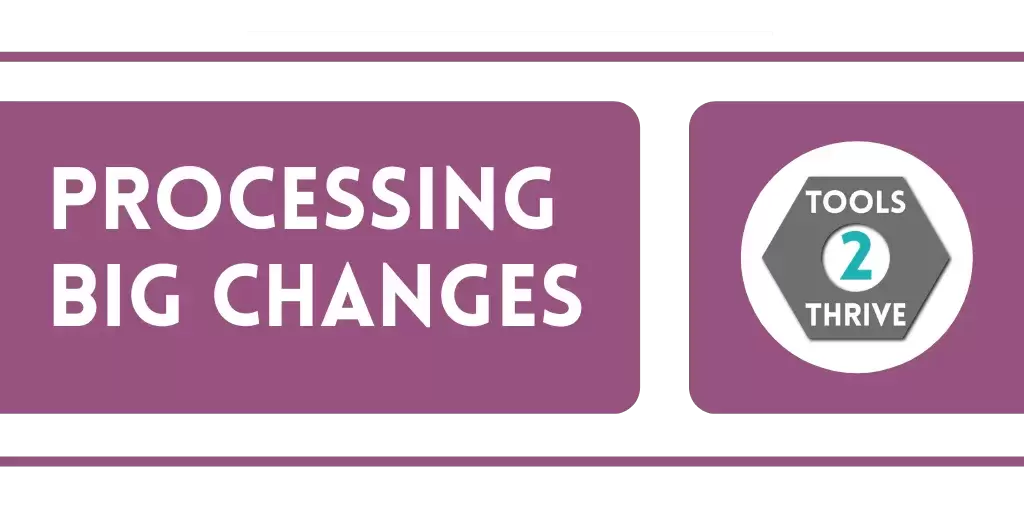
Change is a guaranteed part of life. It’s something everyone experiences at one point or another — good or bad. Sometimes that change happens in big ways when we aren’t expecting it or aren’t prepared for it. These types of situations can make navigating your path forward really difficult. By providing yourself with tools for processing change, you can adapt more easily.
Fast Facts
- People that journaled about significant events reported more satisfaction with their lives and better mental health over those that did not. [1]
- Strong social support from family members following significant life events seriously lessens depression symptoms in teens and has a lasting positive effect in dealing with life changes. [2]
- Adults who avoid problems struggle more with depression later on than those who actively approach problems with coping strategies. [3]
Tips for Processing Change
 Focus on what you can control. One of the hardest things about big change is how helpless it can often make you feel. At some point, you’ll probably have to accept the change that you’re experiencing and then focus on what you can control within that. For example, you can control how you react to situations, how you start each day, or how nice you are to yourself and others. It can be comforting to know that there are still things that you have control over, even when other things are changing.
Focus on what you can control. One of the hardest things about big change is how helpless it can often make you feel. At some point, you’ll probably have to accept the change that you’re experiencing and then focus on what you can control within that. For example, you can control how you react to situations, how you start each day, or how nice you are to yourself and others. It can be comforting to know that there are still things that you have control over, even when other things are changing.
 Write out your feelings on paper. When you’re processing big changes, your brain may feel like it’s constantly racing. It’s easy to feel overwhelmed with all of the things you’re feeling and thinking. Instead of holding it all in your mind, allow yourself to release it. Writing things down is one of the best ways to do that. Start a journal—jot down a quick list of your thoughts and feelings or write a letter to yourself or someone else. Just get it all out onto paper.
Write out your feelings on paper. When you’re processing big changes, your brain may feel like it’s constantly racing. It’s easy to feel overwhelmed with all of the things you’re feeling and thinking. Instead of holding it all in your mind, allow yourself to release it. Writing things down is one of the best ways to do that. Start a journal—jot down a quick list of your thoughts and feelings or write a letter to yourself or someone else. Just get it all out onto paper.
 Keep up your self-care where you can. When so much of your life feels different and overwhelming, it’s tempting to want to stay in bed or on the sofa and avoid what’s bothering you. However, it’s important to keep up your normal habits as much as possible, especially when it comes to protecting your mental health. The changes you’re facing may mean a totally different routine, but incorporating the small, familiar self-care habits that you know work for you — even it’s something simple like showering or taking a walk after dinner — can give you the mental clarity to process the big changes.
Keep up your self-care where you can. When so much of your life feels different and overwhelming, it’s tempting to want to stay in bed or on the sofa and avoid what’s bothering you. However, it’s important to keep up your normal habits as much as possible, especially when it comes to protecting your mental health. The changes you’re facing may mean a totally different routine, but incorporating the small, familiar self-care habits that you know work for you — even it’s something simple like showering or taking a walk after dinner — can give you the mental clarity to process the big changes.
 Find support. With any change that you’re facing right now, there’s a good chance that someone else has felt the exact same way that you’re feeling too. Depending on what you’re struggling with, you may be able to talk to friends or family about it, find an online support group, or open up to a mental health professional. Whoever it ends up being that you turn to, having someone who can listen and provide support can help you through any transition you’re working through.
Find support. With any change that you’re facing right now, there’s a good chance that someone else has felt the exact same way that you’re feeling too. Depending on what you’re struggling with, you may be able to talk to friends or family about it, find an online support group, or open up to a mental health professional. Whoever it ends up being that you turn to, having someone who can listen and provide support can help you through any transition you’re working through.
 Tune into the good. No matter what kind of change has come into your life, there is most likely some grief that coincides with processing it. Even a seemingly good change like getting a new job can have you grieving the day-to-day interactions you had with coworkers where you used to work. Let yourself grieve, but also try not to get stuck spiraling into the fear, anguish, and negativity that those changes may bring. Instead, try and retrain your brain to think of the positives in your life by doing things like practicing gratitude, focusing on the small things that bring you joy, or reframing challenges as opportunities.
Tune into the good. No matter what kind of change has come into your life, there is most likely some grief that coincides with processing it. Even a seemingly good change like getting a new job can have you grieving the day-to-day interactions you had with coworkers where you used to work. Let yourself grieve, but also try not to get stuck spiraling into the fear, anguish, and negativity that those changes may bring. Instead, try and retrain your brain to think of the positives in your life by doing things like practicing gratitude, focusing on the small things that bring you joy, or reframing challenges as opportunities.
 Make plans. It’s okay if you aren’t an incredibly organized person, but when you’re processing big changes, it can be helpful to focus on planning. You don’t have to stick to your plan perfectly; just starting small with what your day or week is going to look like can help get rid of that uncertainty that comes with change.
Make plans. It’s okay if you aren’t an incredibly organized person, but when you’re processing big changes, it can be helpful to focus on planning. You don’t have to stick to your plan perfectly; just starting small with what your day or week is going to look like can help get rid of that uncertainty that comes with change.
 Think of your strength. Big changes tend to challenge and test you, but it’s likely that you’ll grow from all of the things that you’re facing. Remind yourself as often as possible that you are strong and capable and can make it through whatever challenges you’re facing (and that you’ve made it through some tough changes in the past). Maybe even say it out loud to yourself to really let it sink in. With each passing day, you’re building resilience.
Think of your strength. Big changes tend to challenge and test you, but it’s likely that you’ll grow from all of the things that you’re facing. Remind yourself as often as possible that you are strong and capable and can make it through whatever challenges you’re facing (and that you’ve made it through some tough changes in the past). Maybe even say it out loud to yourself to really let it sink in. With each passing day, you’re building resilience.


